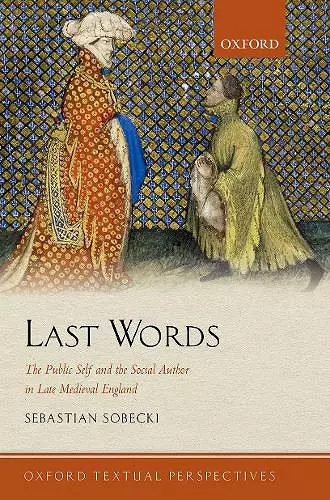Last Words
The Public Self and the Social Author in Late Medieval England
Format:Paperback
Publisher:Oxford University Press
Published:28th Nov '19
Currently unavailable, and unfortunately no date known when it will be back
This paperback is available in another edition too:
- Hardback£77.00(9780198790778)

No medieval text was designed to be read hundreds of years later by an audience unfamiliar with its language, situation, and author. By ascribing to these texts intentional anonymity, we romanticise them and misjudge the social character of their authors. Instead, most medieval poems and manuscripts presuppose familiarity with their authorial or scribal maker. Last Words: The Public Self and the Social Author in Late Medieval England attempts to recover this familiarity and understand the literary motivation behind some of most important fifteenth-century texts and authors. Last Words captures the public selves of such social authors when they attempt to extract themselves from the context of a lived life. Driven by archival research and literary inquiry, this book reveals where John Gower kept the Trentham manuscript in his final years, how John Lydgate wished to be remembered, and why Thomas Hoccleve wrote his best-known work, the Series. It includes documentary breakthroughs and archival discoveries, and introduces a new life record for Hoccleve, identifies the author of a significant political poem, and reveals the handwriting of John Gower and George Ashby. Through its investments in archival study, book history, and literary criticism, Last Words charts the extent to which medieval English literature was shaped by the social selves of their authors.
In Last Words, Sebastian Sobecki brings together two fields of inquiry that have rarely if ever been linked: manuscript studies and philosophy of the mind ... The only chapter in which there is no wholly new archival discovery is that on Lydgate. * Jane Griffiths, Studies in the Age of Chaucer *
Sebastian Sobecki's ambitious monograph, Last Words: The Public Self and the Social Author in Late Medieval England, challenges our perspective of reading late medieval texts and authors as remnants of the distant past, disconnected as we are from the language and contexts of fifteenth-century literature. Instead, Sobecki argues, we should view these texts—by Gower, Hoccleve, Lydgate, and Ashby—as closer contemporary audiences would have, 'created for a specific audience with direct access to the author and a full understanding of a text's fabric of allusions' (p. 7). * Kate Ash-Irisarri et al., The Year's Work in English Studies *
Sobecki's close readings of Gower, Hoccleve, and Lydgate show the tensions that remain within social identities. His detailed archival and codicological work adds significantly to the investigations of contemporary scholars, for whom late medieval textual culture is not just a medium for transmitting works but an environment for composing, reading, and understanding them. * Robert R. Edwards, Speculum *
When texts have been severed from the primary audiences that could fill in any such blanks, then present-day scholars are left to make the attempt. That is the task Sobecki has set himself, and which he is pursuing with admirable energy and enthusiasm. * Alastair Minnis, Medium Ævum *
ISBN: 9780198790785
Dimensions: 200mm x 135mm x 14mm
Weight: 284g
240 pages